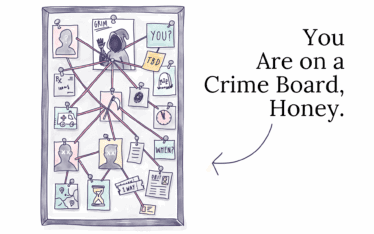Which would you rather?
A) Spend time with your job-hating partner
B) Slam your finger in the car door
C) Die from internal bleeding after slamming your finger in the car door
Most people choose C. Some choose B (there’s an optimist in every crowd!). No sane person chooses A because NO ONE IN THEIR RIGHT MIND WANTS TO SPEND MORE THAN SEVEN CONSECUTIVE MINUTES WITH A JOB-HATING SPOUSE.
So how do you live “the good life” when your partner is wrecking every waking moment of it (and even the sleeping hours too, that tossing-and-turning son of a bitch)?
How do you continue to support and encourage and love the person who is a wretched shadow of their former self?
How do you not end up on Dateline for snuffing the life out of the person who used to not cast that wretched shadow?
Fortunately the answer does not involve homicide (or euthanasia—because they really do appear to be begging to be murdered, don’t they?). No, this involves good old-fashioned psychology, and as your resident positive psychology practitioner, I’m here to bail you out (of your situation—not jail).
Quantifying the problem
I usually write articles that appeal to people who are going to die someday, which means I have a rather broad demographic reach. (Memento mori alert: you’re a ticking time bomb, so you might as well make the most of your remaining Mondays. Hop to it, you little corpse-in-the-making!)
The good news (for me . . . maybe not you so much) is that this article is also relevant to an appalling amount of people. The people at the Gallup organization confirm that 66% of U.S. employees are disengaged at work so far in 2023; 18% of workers are in the “actively disengaged” category, which means they are not only tearing their boss to shreds on Glassdoor, but they’re also real fucking peaches to be around at home.
There is no shortage of woebegone workers out there, which means (according to my back ‘o the napkin calculation) there are about 22 million correspondingly miserable partners, enduring their “woe is me” worse better half.
Identifying the symptoms of spouse-job-hatred
Let’s list the symptoms, in case you’re not crystal clear if your “disenchanted at work loved one” is, in fact, ruining your life:
- Your partner is angry all the time
- Your partner is crying all the time
- Your partner is angry-crying all the time (which is never a flattering look, is it?)
- Your partner is repeating every contentious work conversation in excruciating detail, with a lot of “AND THEN I SAID” and “AND THEN SHE SAID” pseudo-roleplays
- Your partner is despondent (not even willing to get in on the banana split party you’ve arranged to try and snap them out of their melancholic stupor)
- Their ratio of complaining : solutioning is roughly 35,000 : 1
- Your partner impatiently brushes you off when you start to “ideate” with them
- Your partner is up late at night in the dark scrolling through Indeed.com (instead of porn, which would make them normal)
- Your partner is an emotional roller coaster with highs on Friday evenings and crushing lows on Sunday after 3pm
- Your partner can’t be revived even after a week off in Maui, because the doom and gloom of work hangs heavily over the snorkeling excursions
- Your partner is using voodoo dolls with their boss and colleagues’ names on them (and they are still alive and kicking, so it’s not working)
- So. Many. More. Examples.
Things you can do (that don’t involve bodily harm) to handle your job-challenged partner:
Ideas! Some that might resonate, some that might offend! In no particular order!
- Skip town. Not for ghosting-good; just a little break in the action. Getting out of Dodge is not only good for you (allowing for a breather from the walking dead guy you’ve been living with), but it also provides a pattern break for the walking dead guy. Sometimes the troubled person needs space to process their issues, and as charming as you are to be around, you’re part of the pattern, honey bunny. Space x Distance = Suffering Spouse Reflection2. (Math isn’t a core competency of mine so let’s skip the equation audit.)
- Set a “discontent deadline” timer. How long is “too long” to suffer in a super-shit job? If your spouse has been settle-suffering (you know what that is: resignedly accepting a tormented existence as a way of life) for longer than you’re comfortable, it might make sense to agree on a “discontent deadline.” The conversation might sound something like this: “Hey, so I know it’s been a slog at work for you, and my heart goes out to you. I hate to see you suffer because you deserve so much more and you’re a total asshole to be around when you’re unhappy. I’m wondering if it might be helpful to pick a date into the future to take some kind of action? Like a date where if things haven’t gotten better by, you’ll feel inspired to make a change? What do you think?”
- Set a “listening limit” timer. You might be a helpful listener (a.k.a.: a venting partner), and that’s likely not helpful when it’s the 700th day in a row and it’s the same story about how Hector in accounting is sabotaging your wife’s career. When The Husband and I moved in together he noticed I was rehashing the garbage of the day, and since it wasn’t productive, we agreed to spend two minutes max bitching and moaning about the dramas of the day. It then petered out so that we only talked about significant issues where we needed advice . . . and we (er, I) got out of the habit of venting. Relationship saver!
- You: the role model. Sometimes the career-challenged have lost hope in what a good job looks like, or that it even exists at all. If your partner is sounding less and less optimistic about their job horizons, be mindful of how you talk about your own work. If you’re having a pity party and one-upping each other about whose boss sucks the most, well, that sounds like fun, actually. For a minute. But wait! What about editing the conversation to be less about the negative stuff and more about the things that went well in the day, the celebration of small wins, the funny moments? Be a beacon of hope that work isn’t a life sentence. Provide a “grass just might be greener” perspective.
- The sit-down conversation. This isn’t a “let’s chat while peeling the carrots for dinner” kind of conversation. It’s meant to have gravitas (i.e.: 15% dramatic effect). Here’s how the scene could play out: “I want to have a serious conversation about your work, Sweet Cheeks. Do you mind if we have a seat over here? (Grab a comfy seat nowhere close to sharp objects.) “I’m worried about how your job is affecting you. It sounds really lousy, and I’d feel the same way as you if I was in your situation. I think it might be time to escalate things, to start considering some kind of change, because I don’t want to see you having to continue like this. My wish for you is to be in a job that lights you up again, you know? Also, you need to do a way better job of loading the dishwasher.”
- Get a gift certificate for a career coach. “Honey, I care about you so much, and since I’m not an expert in figuring out how to help you soul search/ extract yourself from that long-term-incentive-plan/ spruce up your resume, I found the perfect person who can help you. He’s free next Friday for the first session . . . could that work for you?” (If you don’t know of a good career coach, reach out to me because I know a bunch of them who LIVE to help people wade through the swampy “WTF DO I DO WITH MY CAREER” waters.)
- Remember that you’re not the fixer. It’s a classic partner faux-pas—we think we’re on the hook to solve their problems, because, well, isn’t that what spouses are contractually obligated to do? Every certified coach right now is hot under the collar reading this. You can’t “fix” someone (AND DEAR GOD WE TRY, DON’T WE?). You can’t want something for your partner more than they want it for themselves. All you can do is ask good questions (read The Coaching Habit &/or The Advice Trap) and let them come to their own conclusions. You might also want to watch this quick, goofy, telling video called The Nail.
- Stage an intervention. Get all the people who are adversely affected by your partner’s job-induced misery into a room with lots of bags of Bugles (yes! The horn-shaped corn chip!), and let ‘er rip. (I don’t know what else to say here about interventions other than to make sure you also get the nacho cheese flavored Bugles, because that’s what really gets the party started.)
- Get your own good stuff going. You don’t have to sit in the pit of despair with your partner. Of course you must show empathy and not go on and on about the dream job you’ve just landed . . . but you do need to manage your own happiness and life satisfaction in the midst of an unhappy household. What buffers you from the contagious effect of negativity? You might need a regular outing with friends/ family (the happy ones), a new hobby (“off to woodworking class!”), a workout routine that gets you out of the house every Tuesday + Thursday, whatever floats your boat. That’s the thing: don’t let your deadbeat of a partner sink your ship. Be careful not to postpone your own life.
- Do nothing and wait to die. We all know Einstein’s definition of insanity: doing the same thing over and over again and expecting different results. Your insane partner might be moaning and groaning over and over again about their job and hoping for a better outcome, without being willing to DO something about it . . . which is asinine, through and through. (I’ve been that person so I speak with authority about it’s asinine-ness and insane-ness and unfun-ness.) So if your significant other has fallen into the grotesquely alluring stance of passivity, maybe they just need to whine and play the victim until one of three things happen: until their boss dies (RIP misery-maker!), until the company they work for dies (bankruptcy can help people get on with life, I suppose), or until they bite the biscuit. It’d be a sad way to go, carrying so much venom and regret up until that final heartbeat. I’m being snarky, but maybe this is the reverse psychology your partner needs to hear: “What would happen if you did nothing, Sugarplum?” And then if you are brave/ want to sleep on the couch that night: “You could just do nothing and then wait to die, I guess?”
 It’s a unique kind of torture when your spouse hates their job. You hate to see them suffer, and then as the problem elongates, they make you suffer. It’s a suffer cycle!
It’s a unique kind of torture when your spouse hates their job. You hate to see them suffer, and then as the problem elongates, they make you suffer. It’s a suffer cycle!
Hopefully you are inspired, as a result of our conversation here, to not cut your loved one’s brakes. In the grand scheme of “for better and for worse,” this career conundrum is among the worst of the worst—it’s a doozy of a chapter in a relationship that sucks but just might strengthen your ties when all is said and done. Pick a strategy or two from above to take your own action on, and please try to keep your fingers out of car doors.

P.S.: We should totally Instagram it up!
P.P.S.: Oh and just in case you missed it… I’d love you forever if you took 16 minutes out of your life to watch my TEDx talk!






